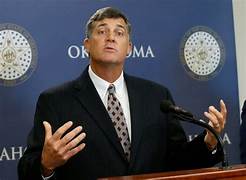
The issue of utility rate hikes in Oklahoma is becoming more and more a “hot button” political issue, hot enough that some feel certain controversial bills in the legislature haven’t moved because candidate filings are taking place for the remainder of the week.
There’s the matter of whether legislators are hesitant about progressing such issues as Right of First Refusal for utility companies in construction of major transmission lines. Or exempting corporation commissioners from most of the state’s Public Meeting Act? Or paying Corporation Commissioners mileage and per diem? Are legislative leaders waiting to learn if such bills draw opponents whose campaigns will be based on protecting the consumers rather than assisting utilities?
We know this—-utility rates will likely draw more attention. A lot more.
Sean Voskuhl, state director of AARP in Oklahoma points to OG&E’s stumble last week when word was released that the utility’s confidential major donation led to naming rights of the new State Fair Arena being finished.
Interviewed on “Scott Mitchell Talks Energy With Jerry Bohnen,” Voskuhl said it’s certainly the number one issue with AARP members who send him “heartbreaking” cards and letters about the rate hikes.

“Look at the landscape—since Winter Storm Uri (2021) we’ve had rate increase on rate increase every year. Currently, OG&E’s asking for one of the largest increases in a very long time–a $332 million rate increase that would increase a residential customer’s bill by nearly $20 a month.”
AARP members are writing Voskuhl to complain of their struggles to pay utility bills while they are on fixed incomes. He said one woman wrote she had to cancel a subscription to a TV network.
“Another says if they have enough money for naming rights, why can’t they lower our bills?”
Voskuhl said the issue of utility rates has “resonated” with customers and Oklahoma Gas and Electric has become the poster boy of the issue.
“People are struggling and it seems like OG&E doesn’t care.”
OG&E has certainly drawn the fire over its State Fair Contribution and even attracted the wrath of Corporation Commissioner Kim David who vowed that whatever money was given to the Fair Board will not be made up by ratepayers.
Adding to the issue is OG&E’s support of what began as a ROFR bill in the legislature, a measure opposed by Voskuhl.
“What we do know, it’s a power grab by the utility companies that really want to control those dollars for transmission buildouts. We like competition in Oklahoma and we think people ought to encourage bids,” he explained.
Voskuhl, a former state legislator, disagrees with HB 4097, contending it takes away any incentive for lower construction costs. He also believes it is yet another example of why utility rates are becoming such a strong campaign issue.
“It just seems like there’s a lack of awareness and maybe arrogance by OG&E of not understanding of what residential ratepayers are going through with rate increases.”
Voskuhl would like to think that some candidates for public office would be finding ways to lower the utility costs of Oklahomans.
“The number one thing we’re hearing about is higher utility costs and of this election, I think the pocketbook issues are front and foremost.”
He said it’s time there is a balance of grass roots supporters “with corporate money and greed that’s happened with many of these utilities.” The AARP leader reminded legislative leaders and utilities, the way the balance can be accomplished is at the election box.
“The way we can balance this is having strong grass roots support and that means ever more in election years because we can vote—don’t ever forget that.”
As for OG&E, Sean Trauschke, Chairman, President and CEO recently wrote shareholders and thanked them for investing n the company as the annual meeting approaches in May.
“Our noble purpose is to energize life for our customers each and every day. That’s not just something we say, it’s how we live our obligation to serve all customers – from the large industrial corporation to our residential customers living in the most rural part of our service area. They each rely on us to deliver the energy they need to power their homes, businesses, and lives,” wrote Trauschke.



